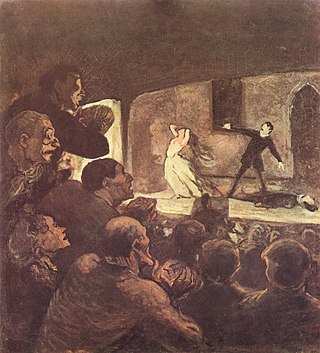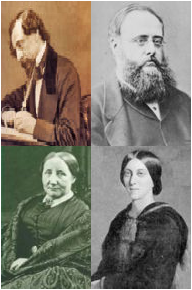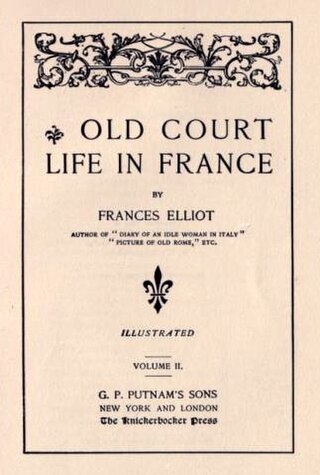Related Research Articles

William Wilkie Collins was an English novelist and playwright known especially for The Woman in White (1859), a mystery novel and early sensation novel, and for The Moonstone (1868), which established many of the ground rules of the modern detective novel and is also perhaps the earliest clear example of the police procedural genre.

The Moonstone: A Romance by Wilkie Collins is an 1868 British epistolary novel. It is an early example of the modern detective novel, and established many of the ground rules of the modern genre. Its publication was started on 4 January 1868 and was completed on 8 August 1868. The story was serialised in Charles Dickens's magazine All the Year Round. Collins adapted The Moonstone for the stage in 1877.

Sir David Wilkie was a Scottish painter, especially known for his genre scenes. He painted successfully in a wide variety of genres, including historical scenes, portraits, including formal royal ones, and scenes from his travels to Europe and the Middle East. His main base was in London, but he died and was buried at sea, off Gibraltar, returning from his first trip to the Middle East. He was sometimes known as the "people's painter".

Household Words was an English weekly magazine edited by Charles Dickens in the 1850s. It took its name from the line in Shakespeare's Henry V: "Familiar in his mouth as household words."

A modern melodrama is a dramatic work in which the plot, typically sensationalized and for a very strong emotional appeal, takes precedence over detailed characterization. Melodramas typically concentrate on dialogue that is often bombastic or excessively sentimental, rather than action. Characters are often flat, and written to fulfill established character archetypes. Melodramas are typically set in the private sphere of the home, focusing on morality and family issues, love, and marriage, often with challenges from an outside source, such as a "temptress", a scoundrel, or an aristocratic villain. A melodrama on stage, filmed, or on television is usually accompanied by dramatic and suggestive music that offers further cues to the audience of the dramatic beats being presented.

Edward Matthew Ward,, was a British painter who specialised in historical genre. He is best known for his murals in the Palace of Westminster depicting episodes in British history from the English Civil War to the Glorious Revolution.

Charles Allston Collins was a British painter, writer, and illustrator associated with the Pre-Raphaelite Brotherhood.

"A House to Let" is a novella written as collaborative fiction by Charles Dickens, Wilkie Collins, Elizabeth Gaskell and Adelaide Anne Procter. It was originally published in 1858 in the Christmas edition of Dickens's Household Words magazine. Collins wrote the introduction and collaborated with Dickens on the second story and ending, while Gaskell and Proctor wrote the third and fifth chapters respectively.

The Frozen Deep is an 1856 play, originally staged as an amateur theatrical, written by Wilkie Collins under the substantial guidance of Charles Dickens. Dickens's hand was so prominent—beside acting in the play for several performances, he added a preface, altered lines, and attended to most of the props and sets—that the principal edition of the play is entitled "Under the Management of Charles Dickens". John C. Eckel wrote: "As usual with a play which passed into rehearsal under Dickens' auspices it came out improved. This was the case with The Frozen Deep. The changes were so numerous that the drama almost may be ascribed to Dickens". Dickens himself took the part of Richard Wardour and was stage-manager during its modest original staging in Dickens's home Tavistock House. The play, however, grew in influence through a series of outside performances, including one before Queen Victoria at the Royal Gallery of Illustration, and a three-performance run at the Manchester Free Trade Hall for the benefit of the Douglas Jerrold Fund to benefit the widow of Dickens's old friend, Douglas Jerrold. There, night after night, everyone—including, by some accounts, the carpenters and the stage-hands—was moved to tears by the play. It also brought Dickens together with Ellen Ternan, an actress he hired to play one of the parts, and for whom he would later leave his wife Catherine. The play remained unpublished until a private printing appeared sometime in 1866.
The bibliography of Charles Dickens (1812–1870) includes more than a dozen major novels, many short stories, several plays, several non-fiction books, and individual essays and articles. Dickens's novels were serialized initially in weekly or monthly magazines, then reprinted in standard book formats.

The Black Robe is an 1881 partially-epistolary novel by famed English writer, Wilkie Collins. The book, which relates the misadventures of one "Lewis Romayne", is noted for its anti-Catholic lens.

Frances Minto Elliot (1820–1898) was a prolific English writer, primarily of non-fiction works on the social history of Italy, Spain, and France and travelogues. She also wrote three novels and published art criticism and gossipy, sometimes scandalous, sketches for The Art Journal, Bentley's Miscellany, and The New Monthly Magazine, often under the pseudonym, "Florentia". Largely forgotten now, she was very popular in her day, with multiple re-printings of her books in both Europe and the United States. Elliot had a wide circle of literary friends including Charles Dickens, Anthony Trollope and Wilkie Collins. Collins dedicated his 1872 novel, Poor Miss Finch, to her, and much of the content in Marian Holcolmbe's conversations in The Woman in White is said to be based on her.

Tavistock House was the London home of the noted British author Charles Dickens and his family from 1851 to 1860. At Tavistock House Dickens wrote Bleak House, Hard Times, Little Dorrit and A Tale of Two Cities. He also put on amateur theatricals there which are described in John Forster's Life of Charles Dickens. Later, it was the home of William and Georgina Weldon, whose lodger was the French composer Charles Gounod, who composed part of his opera Polyeucte at the house.

The Moonstone is a 1934 American mystery film directed by Reginald Barker and starring David Manners, Phyllis Barry, Gustav von Seyffertitz and Jameson Thomas. It is an adaptation of the 1868 novel The Moonstone by Wilkie Collins. The film retains the book's British location, but uses a contemporary 1930s setting rather than the Victorian era of the original. It is one of three film versions of the novel, which include silent versions in 1915 and 1909, although a number of television and radio adaptations have been made.
Hide and Seek is Wilkie Collins' third published novel, first published on 6 June 1854. It is the first of his novels involving the solution of a mystery, the elements of which are clearer to the reader than to the novel's characters. Suspense is created from the reader's uncertainty as to which characters will find out the truth, when and how.

The Moonstone is a daytime drama series produced by King Bert Productions for BBC One. It is an adaptation of the Wilkie Collins 1868 novel of the same name described by T.S. Eliot as the first and greatest of English detective novels. It stars Josh Silver and John Thomson.
The World was a British weekly paper, published in London from 1874 to 1920. It was founded by Edmund Hodgson Yates (1831–1894) and E. C. Grenville Murray (1824–1881) and became one of the leading society papers with investigative reports, gossip and an intimate style of journalism. Among its staff and contributors were William Archer, Wilkie Collins and Bernard Shaw.

Callum Sebastian Nelmes Wilkie is an Australian rules footballer playing for St Kilda in the Australian Football League (AFL). A defender, he played in the South Australian National Football League (SANFL) and was overlooked at four national drafts before St Kilda selected him with pick 3 in the 2019 rookie draft. Wilkie debuted in the opening round of the 2019 season and is yet to miss an AFL match for St Kilda since his debut, playing 124 consecutive matches for the Saints.
Fallen Leaves may refer to:

Sergeant Richard Cuff is a fictional character in Wilkie Collins' 1868 novel The Moonstone. He represents one of the earliest portrayals of a police detective in an English novel.
References
- ↑ Collins, Wilkie (1880). The Fallen Leaves. Chatto and Windus, Piccadilly.
- ↑ "THE FALLEN LEAVES - Wilkie Collins". www.wilkie-collins.info. Retrieved 2023-10-19.
- ↑ "Plot Summary: The Fallen Leaves". jhrusk.github.io. Retrieved 2023-10-19.
